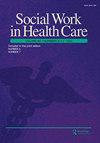急诊科的社会工作:社会决定因素、干预措施和结果的多维分析。
IF 1.8
4区 社会学
Q1 SOCIAL WORK
引用次数: 0
摘要
这项回顾性队列研究调查了2019年2月至2024年2月期间本文章由计算机程序翻译,如有差异,请以英文原文为准。
Social work in emergency departments: A multi-dimensional analysis of social determinants, interventions, and outcomes.
This retrospective cohort study examined social work interventions in the emergency department (ED) of a high-capacity tertiary care center in Türkiye, between February 2019 and February 2024. Data from 714 adult patients referred to the hospital's social work unit were analyzed. Of these patients, 54.8% were female, the mean age was 46.3 years, and over 40% required multidisciplinary interventions. The most common diagnoses were lack of family support and homelessness (35.0%), physical disorders (28.7%), and assault (20.0%). The leading interventions were psychosocial support (40.8%), facilitation of housing and transportation (32.8%), and contact with relatives (25.1%). A significant difference was found between daytime and nighttime consultations, with unmet needs more frequent during off-hours (p < .001). Among survivors of the 2023 Türkiye earthquakes, 96.7% required hospitalization or referral to support services, underscoring the importance of post-disaster hospital-based social work in addressing ongoing psychosocial needs. These results emphasize the role of ED social workers in meeting urgent psychosocial needs, supporting disaster-affected patients, and ensuring continuity of care, thereby enhancing patient outcomes, improving care continuity, and optimizing healthcare resource utilization. Policies ensuring 24/7 social work coverage in EDs may further strengthen these benefits.
求助全文
通过发布文献求助,成功后即可免费获取论文全文。
去求助
来源期刊

Social Work in Health Care
SOCIAL WORK-
CiteScore
3.80
自引率
9.10%
发文量
25
期刊介绍:
Devoted to social work theory, practice, and administration in a wide variety of health care settings, this journal gives you the tools to improve your practice while keeping you up-to-date with the latest crucial information. Social Work in Health Care is edited by Gary Rosenberg, PhD, one of the most respected leaders in health social work. This creative, lively journal brings you the most important articles on research, leadership, clinical practice, management, education, collaborative relationships, social health policy, and ethical issues from the most respected experts in the field. The journal"s special issues comprehensively discuss a single pertinent health care theme.
 求助内容:
求助内容: 应助结果提醒方式:
应助结果提醒方式:


